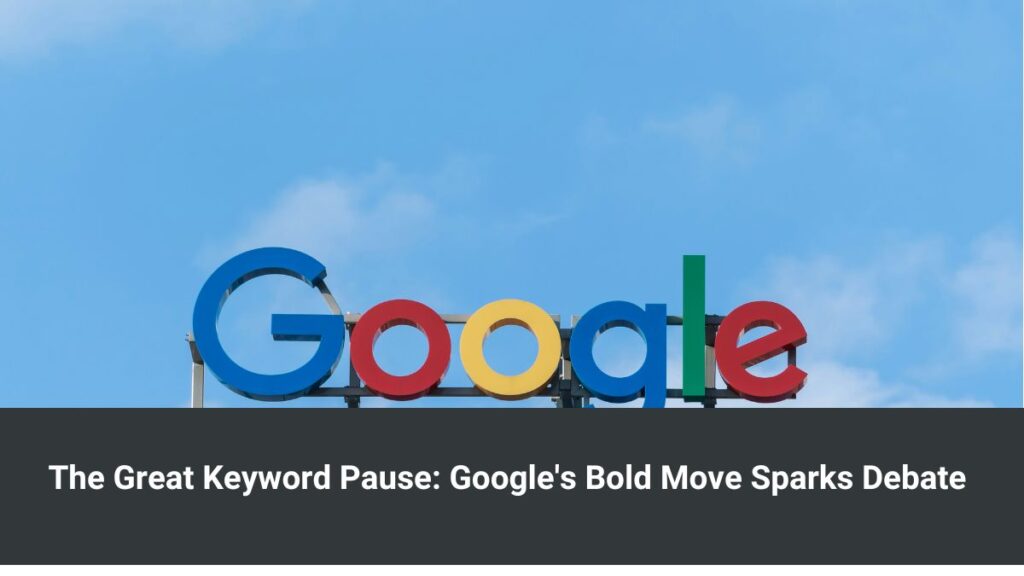In the ever-evolving landscape of digital marketing, Google has once again stirred the pot with an announcement that has sent ripples through the paid search community. The tech giant’s plan to automatically pause keywords that have been idle for over 13 months has ignited a fiery discourse among advertisers. Is this a long-overdue spring cleaning of cluttered accounts, or an algorithmic overreach that threatens the careful curation of campaigns? Let’s dive into the depths of this development and explore the implications for marketers big and small.
The Announcement Heard ‘Round the PPC World
Picture this: You’re sipping your morning coffee, scrolling through industry news, when suddenly you see it—Google’s latest decree. Keywords gathering dust for more than a year will be automatically paused. Your first reaction might mirror that of many: a mix of surprise, concern, and perhaps a dash of indignation. After all, those keywords are yours, aren’t they?
Google’s rationale is simple: streamline account management by clearing out the cobwebs. But for many advertisers, those cobwebs hold sentimental—and sometimes strategic—value. It’s akin to your mom deciding it’s time to donate your old toys; sure, you haven’t played with them in ages, but what if you need them someday?
The Data Dilemma: Numbers Never Lie
Before we get carried away with metaphors about childhood keepsakes, let’s look at the cold, hard facts. Optmyzr, ever the voice of reason in PPC debates, conducted a study across over 9,400 Google Ads accounts. The findings? A staggering 84% of accounts had more than half their keywords languishing without a single impression for over 13 months. It’s like discovering that most of your wardrobe hasn’t seen the light of day since the last presidential election.
For the vast majority of advertisers, these keywords are the digital equivalent of an appendix—present, but not particularly useful. Pausing them is unlikely to cause so much as a hiccup in performance. However, the study did identify a small cohort of 145 large accounts (a mere 1.5%) that could face potential performance loss. These are the power users, the keyword hoarders if you will, who might find Google’s housekeeping a tad too zealous.
The Great Divide: Overreach or Overdue?
The announcement has carved a chasm in the PPC community, with passionate voices on both sides. Let’s eavesdrop on the debate:
Team Overreach: “Hands Off Our Keywords!”
For some, Google’s move feels like an invasion of privacy, a digital manifest destiny where the platform extends its reach into the sacred space of account management. Kirk Williams, owner of ZATO and a respected voice in the industry, told Optmyzr, “Google continues to blur the lines between platform and ad partner.” It’s a sentiment echoed by many who see this as another step towards a fully automated, less transparent Google Ads ecosystem.
The concerns are not without merit. What about seasonal businesses that might see surges of activity after long periods of dormancy? Or niche products with sporadic, yet valuable, traffic? There’s a fear that Google’s one-size-fits-all approach could prematurely pause keywords on the cusp of their moment in the sun.
Team Overdue: “It’s About Time!”
On the flip side, many advertisers are welcoming this change with open arms. For them, it’s like having a personal organizer come in and finally tackle that junk drawer you’ve been avoiding. Streamlined account structures, simpler budgeting, and alignment with Google’s automation-first philosophy are music to their ears.
I remember working with a client whose account was a labyrinth of long-forgotten keywords. Sifting through them was like an archaeological dig, each layer revealing the remnants of past strategies and abandoned products. When we finally pruned the account, not only did it become more manageable, but performance actually improved. Sometimes, less really is more.
The Bigger Picture: Google’s Automation Agenda
This keyword pause isn’t happening in a vacuum. It’s part of a larger trend where Google is nudging—some might say shoving—advertisers towards a more automated future. From smart bidding to responsive search ads, the message is clear: trust the machine.
But therein lies the rub. As Google takes on more decision-making roles traditionally held by marketers, questions of control and strategy come to the forefront. Are we witnessing the twilight of the PPC strategist, or the dawn of a new era where human insight and machine efficiency dance in perfect harmony?
Navigating the New Normal: Tips for Advertisers
So, what’s a savvy marketer to do in the face of this impending change? Here are a few strategies to consider:
- Audit Now, Thank Yourself Later: Don’t wait for Google to decide which keywords get the axe. Take a proactive approach and review your account. You might be surprised by what you find—and what you can safely pause yourself.
- Embrace the BMM Legacy: With broad match modifiers (BMM) being sunset, many accounts have duplicate keywords. This is your chance to consolidate and strengthen your account’s foundation.
- Keep an Eye on the Horizon: For businesses with cyclical or unpredictable traffic patterns, set calendar reminders to review and potentially reactivate paused keywords before your peak seasons.
- Leverage Labels and Annotations: Use Google Ads labels to mark keywords you believe are vital, even if dormant. This can help you quickly identify and reactivate them if needed.
Adapting to the Ever-Changing Tide
As we stand at this crossroads of paid search, it’s clear that Google’s auto-pause feature is neither entirely an overreach nor completely overdue—it’s a complex shift that reflects the changing tides of digital advertising. For most, it will be a welcome decluttering. For others, a prompt to reevaluate and perhaps restructure longstanding strategies.
The key takeaway? Adaptability is the marketer’s greatest asset. Whether you view this change as a helping hand or a hindrance, the PPC landscape will continue to evolve. Our job is not just to keep up, but to anticipate, to innovate, and to find opportunity in every algorithm update and policy shift.
So, I put the question to you: How will you ride this wave? Will you let Google’s automation sweep you along, or will you harness it to power your own strategic vision? The keywords may pause, but the conversation—and the potential for growth—never stops. Let’s embrace this change not as an end, but as a beginning—a chance to refine our craft and redefine what it means to be a PPC professional in an increasingly automated world.

